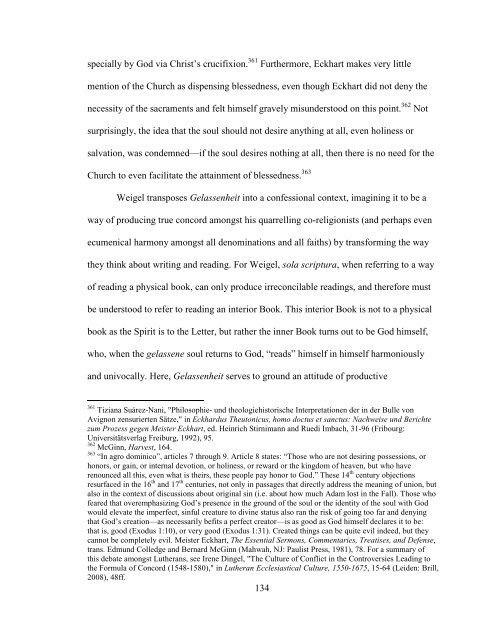the mystical theology of valentin weigel - DataSpace at Princeton ...
the mystical theology of valentin weigel - DataSpace at Princeton ...
the mystical theology of valentin weigel - DataSpace at Princeton ...
Create successful ePaper yourself
Turn your PDF publications into a flip-book with our unique Google optimized e-Paper software.
specially by God via Christ’s crucifixion. 361 Fur<strong>the</strong>rmore, Eckhart makes very little<br />
mention <strong>of</strong> <strong>the</strong> Church as dispensing blessedness, even though Eckhart did not deny <strong>the</strong><br />
necessity <strong>of</strong> <strong>the</strong> sacraments and felt himself gravely misunderstood on this point. 362 Not<br />
surprisingly, <strong>the</strong> idea th<strong>at</strong> <strong>the</strong> soul should not desire anything <strong>at</strong> all, even holiness or<br />
salv<strong>at</strong>ion, was condemned—if <strong>the</strong> soul desires nothing <strong>at</strong> all, <strong>the</strong>n <strong>the</strong>re is no need for <strong>the</strong><br />
Church to even facilit<strong>at</strong>e <strong>the</strong> <strong>at</strong>tainment <strong>of</strong> blessedness. 363<br />
Weigel transposes Gelassenheit into a confessional context, imagining it to be a<br />
way <strong>of</strong> producing true concord amongst his quarrelling co-religionists (and perhaps even<br />
ecumenical harmony amongst all denomin<strong>at</strong>ions and all faiths) by transforming <strong>the</strong> way<br />
<strong>the</strong>y think about writing and reading. For Weigel, sola scriptura, when referring to a way<br />
<strong>of</strong> reading a physical book, can only produce irreconcilable readings, and <strong>the</strong>refore must<br />
be understood to refer to reading an interior Book. This interior Book is not to a physical<br />
book as <strong>the</strong> Spirit is to <strong>the</strong> Letter, but ra<strong>the</strong>r <strong>the</strong> inner Book turns out to be God himself,<br />
who, when <strong>the</strong> gelassene soul returns to God, “reads” himself in himself harmoniously<br />
and univocally. Here, Gelassenheit serves to ground an <strong>at</strong>titude <strong>of</strong> productive<br />
361 Tiziana Suárez-Nani, "Philosophie- und <strong>the</strong>ologiehistorische Interpret<strong>at</strong>ionen der in der Bulle von<br />
Avignon zensurierten Sätze," in Eckhardus Theutonicus, homo doctus et sanctus: Nachweise und Berichte<br />
zum Prozess gegen Meister Eckhart, ed. Heinrich Stirnimann and Ruedi Imbach, 31-96 (Fribourg:<br />
Universitätsverlag Freiburg, 1992), 95.<br />
362 McGinn, Harvest, 164.<br />
363 “In agro dominico”, articles 7 through 9. Article 8 st<strong>at</strong>es: “Those who are not desiring possessions, or<br />
honors, or gain, or internal devotion, or holiness, or reward or <strong>the</strong> kingdom <strong>of</strong> heaven, but who have<br />
renounced all this, even wh<strong>at</strong> is <strong>the</strong>irs, <strong>the</strong>se people pay honor to God.” These 14 th century objections<br />
resurfaced in <strong>the</strong> 16 th and 17 th centuries, not only in passages th<strong>at</strong> directly address <strong>the</strong> meaning <strong>of</strong> union, but<br />
also in <strong>the</strong> context <strong>of</strong> discussions about original sin (i.e. about how much Adam lost in <strong>the</strong> Fall). Those who<br />
feared th<strong>at</strong> overemphasizing God’s presence in <strong>the</strong> ground <strong>of</strong> <strong>the</strong> soul or <strong>the</strong> identity <strong>of</strong> <strong>the</strong> soul with God<br />
would elev<strong>at</strong>e <strong>the</strong> imperfect, sinful cre<strong>at</strong>ure to divine st<strong>at</strong>us also ran <strong>the</strong> risk <strong>of</strong> going too far and denying<br />
th<strong>at</strong> God’s cre<strong>at</strong>ion—as necessarily befits a perfect cre<strong>at</strong>or—is as good as God himself declares it to be:<br />
th<strong>at</strong> is, good (Exodus 1:10), or very good (Exodus 1:31). Cre<strong>at</strong>ed things can be quite evil indeed, but <strong>the</strong>y<br />
cannot be completely evil. Meister Eckhart, The Essential Sermons, Commentaries, Tre<strong>at</strong>ises, and Defense,<br />
trans. Edmund Colledge and Bernard McGinn (Mahwah, NJ: Paulist Press, 1981), 78. For a summary <strong>of</strong><br />
this deb<strong>at</strong>e amongst Lu<strong>the</strong>rans, see Irene Dingel, "The Culture <strong>of</strong> Conflict in <strong>the</strong> Controversies Leading to<br />
<strong>the</strong> Formula <strong>of</strong> Concord (1548-1580)," in Lu<strong>the</strong>ran Ecclesiastical Culture, 1550-1675, 15-64 (Leiden: Brill,<br />
2008), 48ff.<br />
134
















